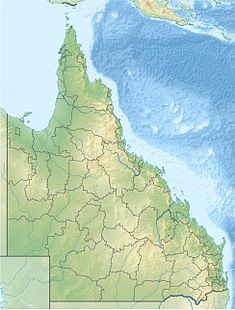The Mount Crosby Weir is a heritage-listed weir on the Brisbane River at Mount Crosby and Chuwar, both in City of Brisbane, Queensland, Australia. The project was instigated by John Petrie at the end of the 19th century. The town of Brisbane was expanding and seeking more reliable sources of drinking water than Enoggera Dam and Gold Creek Dam could provide. In conjunction with the Mount Crosby Pumping Station, it was listed on the Queensland Heritage Register on 25 October 2019.[2]
| Mount Crosby Weir | |
|---|---|
 View from the southern side of the weir, looking upstream, towards the reservoir. | |
Location of the Mount Crosby Weir in Queensland | |
| Country | Australia |
| Location | South East Queensland |
| Coordinates | 27°32′14″S 152°47′52″E / 27.53722°S 152.79778°E |
| Purpose | Potable water supply |
| Status | Operational |
| Opening date | 1892 |
| Operator(s) | SEQ Water |
| Dam and spillways | |
| Type of dam | Weir |
| Impounds | Brisbane River |
| Height | 4.57 m (15.0 ft) |
| Length | 81.4 m (267 ft) |
| Reservoir | |
| Total capacity | 3,430 ML (750×106 imp gal; 910×106 US gal)[1] |
| Maximum width | 30.5 m (100 ft) |
| Normal elevation | 141.34 m (463.7 ft) AHD |
| Website www.seqwater.com.au | |
Location and features
editThe location was selected because it was just above the upstream tidal flow of seawater at Colleges Crossing. The concrete structure was completed in April 1892.[3] The dam wall rises 4.57 metres (15.0 ft) and is 81.4 metres (267 ft) in length.[3] The weir has a capacity of 3,430 megalitres (750×106 imp gal; 910×106 US gal), making it one of the largest weirs in the region.[1] Above the weir is a one-lane road which is open to the public.
The nearby Mount Crosby Pumping Station is used to transport drinking water that is sourced from both the weir and the nearby Lake Manchester Dam, which was built shortly after the Mount Crosby Weir.
Without an ongoing eradication program, water hyacinth weed can choke the waters behind the weir, all the way upstream to Fernvale. In 2009, the weir was flushed to remove algae and organic matter that had built up.[4]
Heritage listing
editSee also
editReferences
edit- ^ a b "Weirs". Water supply: Dams and weirs. Seqwater. 2014. Archived from the original on 26 August 2014. Retrieved 5 July 2014.
- ^ "Mount Crosby Pumping Station Complex (entry 650236)". Queensland Heritage Register. Queensland Heritage Council. Retrieved 28 April 2021.
- ^ a b Horton, Helen (1988). Brisbane's Back Door: The story of the D'Aguilar Range. Bowen Hills, Queensland: Boolarong Publications. p. 79. ISBN 0-86439-036-X.
- ^ Chung, Francis (15 January 2009). "Tests show Mount Crosby Treatment Plant water improving". The Courier-Mail. Queensland Newspapers. Archived from the original on 5 September 2012. Retrieved 16 November 2009.
